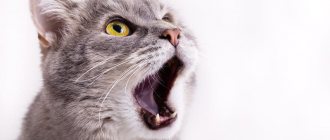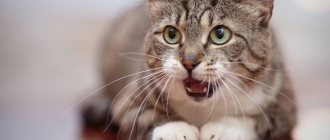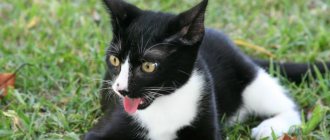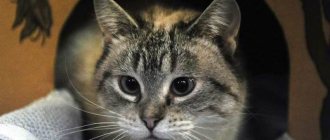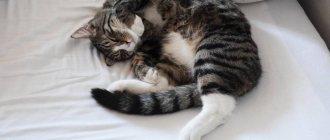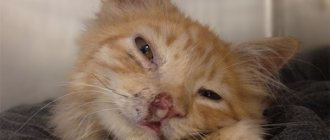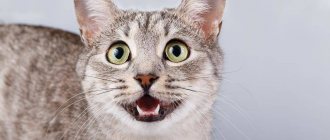Sometimes cats breathe with their mouths open, just like dogs. It’s unusual to see this “trick” performed by a domestic cat, and many owners begin to worry: is everything okay with their pet or is it time to run to the vet?
We hasten to reassure you: in most cases, breathing through a cat’s mouth is absolutely normal. But there are situations when this can be a wake-up call.
Let's talk about everything in order.
Features of breathing in cats
It’s worth starting with the fact that among the reasons why cats switch to this type of breathing, there are physiological ones, that is, those that are normal and pathological ones, caused by various diseases.
One of the cases of physiological mouth breathing in cats on video.
But, of course, this is rather a pleasant and funny case when a cat breathes with its mouth open. But this is not always the case. Mouth breathing, caused by physiological reasons, usually does not last long, immediately after oxygen saturation, the body returns to normal mode. Happens when:
- High ambient temperatures are more common in long-haired and plush breeds.
- And also after intense physical activity, especially in cats with severe obesity.
Life expectancy with dementia
It is impossible to give an accurate forecast of how long a person with dementia will live. Dementia comes in different types and can be slow and gradual, or it can progress and be fatal very quickly. Much depends on age, health status, care and adequate therapy.
Life expectancy with vascular dementia
Vascular dementia is a severe form of the disease. Dementia is caused by vascular disease, often develops after an ischemic cerebral infarction or hemorrhagic stroke, with atherosclerosis or hypertension; factors in the development of this form of the disease can be heart defects, high lipid levels and other disorders. Vascular dementia affects men more often.
In dementia accompanied by Parkinson's or Huntington's disease, the prognosis depends on adequate treatment of these diseases. Most often, dementia with such concomitant diseases is not characterized by rapid progression; the life expectancy prognosis is several years, with Huntington's disease - up to 10-15 years. Dementia with Lewy bodies is a rapidly progressive disease with a life expectancy of about 7 years.
Life expectancy for other types of dementia
Dementia can be caused by various diseases. Very often, senile dementia is associated with Alzheimer's disease. In this case, the patient’s age plays an important role: the older the patient, the slower the disease progresses; The younger the patient, the more the disease progresses. The average life expectancy of a patient with Alzheimer's disease is about 6-10 years from the time of diagnosis. Much depends on the age and stage of the disease, the individual characteristics of the body.
Adequate treatment prescribed at an early stage of the disease can significantly prolong life and alleviate the condition. Specialists from the neurology department of the Yusupov Hospital have extensive experience in treating dementia and many other related diseases. Modern diagnostic equipment makes it possible to determine the areas of brain damage and the degree of development of dementia. The use of innovative world-class techniques at the Yusupov Hospital can improve the quality of life for patients with dementia.
Life expectancy in early dementia
Life expectancy at an early stage of the disease largely depends on the age of the patient. The younger the patient, the more complex and faster the disease progresses. In older people, the disease does not develop as quickly. Detected dementia at an early stage allows you to remain in adequate condition for a long time and take care of yourself. Manifestations of dementia at an early stage are:
- forgetfulness,
- slight mood swings,
- slight decrease in intelligence.
Life expectancy of bedridden patients with dementia
Bedridden patients with dementia are most often people who are at an advanced stage of the disease. Bedridden patients with dementia often die from pneumonia and sepsis, concomitant diseases already at a severe stage of dementia. The prognosis for dementia in bedridden patients is unfavorable, the condition is complicated by physical inactivity, impaired mental activity, and circulatory disorders.
Patients in serious condition are completely dependent on outside care; dementia is complicated by other diseases due to the patient’s immobility. At the Yusupov Hospital, relatives of the patient are trained. Caring for bedridden patients is complex and requires patience and knowledge about the characteristics of the disease.
Life expectancy of patients with dementia with optimal treatment
Life expectancy with dementia depends on the adequacy of treatment and care. At the first stage, the doctor prescribes diagnostic tests to differentiate dementia from other diseases. Treatment of senile dementia is based on eliminating the symptoms of the disease and reducing the risk of dementia progression.
Dementia is an incurable disease, the course of which depends on many factors - age, gender, type of dementia, concomitant diseases, adequate treatment and care. A calm environment and lack of stress help reduce the risk of progression of senile dementia.
Doctors recommend a special diet, vitamin therapy, music therapy, aromatherapy, acupuncture and other methods that improve brain activity. The average life expectancy of a young patient with dementia can be about 7 years; older people with dementia live on average from 7 to 15 years.
Causes of mouth breathing
The causes of heavy mouth breathing in cats due to illness are much more extensive. The main function of the respiratory system is to saturate the body with oxygen when inhaling and removing carbon dioxide when exhaling. The upper and lower respiratory tracts, lungs and respiratory muscles participate in this gas exchange.
A disruption in the functioning of any of the components leads to a malfunction in the system and oxygen starvation; in order to compensate for the lack of vital O2, the body has to change the type of breathing. Let us consider in more detail the pathologies that can cause acute respiratory failure. They are divided into two groups: the pulmonary form, which is directly related to diseases of the respiratory system, and the ventilation form, which is a gas exchange disorder caused by extrapulmonary diseases.
| The pulmonary form includes |
|
| Violation of central regulation and patency of the nerve impulse |
|
| Muscle disorders |
|
| Disorders related directly to the chest |
|
| The course of respiratory failure may be |
|
And it depends on the reasons that caused the pathology. One of the most common is pulmonary edema.
Signs of wheezing
The cat is coughing: why it wheezes, the reasons, as if it was choking
Wheezing is understood as noisy breathing, against the background of which a combination of many wheezing and whistling sounds is heard. Such deviation from normal breathing is a frequent companion to most pathologies of the animal’s respiratory tract.
Wheezing can occur for two reasons:
- in the process of narrowing the lumen of the respiratory tract;
- due to the accumulation and foaming of fluid in the respiratory system.
Noises and wheezing when breathing do not bode well
In addition, wheezing means a hoarse, strained voice or its complete absence. This pathology occurs due to incomplete closure of the vocal cords due to the accumulation of mucus in the glottis, which is a common symptom of many inflammatory processes.
The cat is breathing heavily and wheezing
Reasons that lead to loss of voice:
- Respiratory diseases are one of the common causes of wheezing when breathing in a cat. We are talking about various viral and infectious diseases that can be picked up by hypothermia in the cold season. It could be a cold or acute respiratory infection.
- Advanced respiratory diseases can lead to the development of pneumonia, viral feline rhinotracheitis, tonsillitis, calcivirosis or bronchial asthma, a common symptom of which is also loss of voice and wheezing.
- A foreign body in the larynx mechanically damages the surface of the pharynx due to the inability to swallow or regurgitate. This ultimately leads to the cat wheezing when he breathes. A pet can injure its throat with a thin or broken chicken bone, a tree branch, or choking on a spruce needle. Such damage is dangerous due to the high probability of a foreign object entering further into the digestive tract, injuring the upper respiratory tract and esophagus.
- Heart pathology. If the cat begins to show less activity, preferring to lie down instead of playing, walks slowly towards the bowl, as if overcoming obstacles, and upon reaching the goal, chokes, coughs or sneezes, this may be a sign of the development of heart pathologies. Often, owners are not even aware of the onset of heart problems in their cats due to the absence of symptoms. The disease develops, the body reaches a critical point, and after that symptoms appear and increase exponentially. A hoarse cat suffers from severe shortness of breath even after the slightest exertion. She has cold paw pads and ears, pallor of visible mucous membranes (gums, palate, eyes) due to poor blood circulation, in severe advanced cases, audible wheezing in the cat and bubbling in the chest, cold surface of the skin throughout the body.
The cat is trying to vomit a small object stuck in its throat
- Blood pathologies with a lack of iron in the body can also cause difficulty breathing with wheezing.
- With asthma, a cat wheezes and wheezes, presses to the floor, coughs, stretching its neck. As the disease progresses, severe shortness of breath and wheezing, even suffocation, appear.
- Pulmonary edema in a cat is an abnormal accumulation of fluid in the lungs, which is a consequence of various diseases of the internal organs and inflammatory processes. In this case, the cat wheezes when breathing with gurgling. He feels lethargic, phlegmatic, and desires to constantly sleep. The pet opens its mouth slightly with its tongue hanging out when breathing, inflating its belly and sides, trying to squeeze out liquid by coughing and swallowing; when coughing up, traces of blood, a bluish tint to the oral mucosa, and mucus from the nose may appear. A common urge of a cat is to expand its chest by standing in a position with its paws spread wide apart. Deterioration of the condition forces the cat to stretch out on its side.
- The accumulation of large amounts of fluid can be not only in the lungs, but also in the abdominal cavity. This pathology is called abdominal ascites, or dropsy. The pressure of the accumulated fluid compresses the internal organs, disrupting their activity. If dropsy is not treated in time, it can lead to the death of your pet.
Asthma can cause your cat to suffocate if you don't take action.
Pulmonary edema in a cat
Pulmonary edema is a condition in which the level of fluid in the lungs is higher than normal. Blood plasma leaves the vessel and fills the intercellular pulmonary space. The lungs increase in size, but can no longer fully perform their direct function.
The reason for oxygen starvation during edema is that with each breath, the accumulated liquid tends to foam. From one milliliter of such liquid, about 15 milliliters of foam are obtained.
As it accumulates, it fills the airways and significantly increases the load on the respiratory muscles. The oxygen that enters the lungs simply does not reach the alveoli, mixing with foam bubbles. As a result, respiratory failure progresses.
Specifics of diseases of purebred cats
In some purebred animals, as well as their mixed breeds, edema can be caused by heart failure. If we talk about breeds, the most predisposed are Scottish Fold, Oriental and Abyssinian cats, Sphynxes, Cornish Rexes and Maine Coons.
Symptoms of pulmonary edema in cats and kittens
Video about the symptoms of pulmonary edema in cats and dogs
As for clinical symptoms and manifestations, at first there is lethargy, complete or partial loss of appetite, and decreased activity of the cat. Over time, anxiety, shortness of breath (the cat breathes through its mouth), and tachycardia appear. Lack of oxygen causes cyanosis of the mucous membranes.
More severe conditions are accompanied by wheezing, initially dry, then wet. White foam appears from the nose and mouth, sometimes mixed with blood. Coordination and heart rhythm are impaired. The outcome of respiratory failure can be a hypoxemic coma, as a result of the death of brain cells due to lack of oxygen and the death of the animal, if it does not occur earlier due to the severity of the condition.
Frequent, difficult breathing through the mouth and cyanosis (blue color of the oral mucosa) require urgent treatment at the hospital for examination by a veterinarian. Since the reason that caused this condition can threaten health and even life.
Providing emergency care for a pet
Every cat owner should know the list of warning signs that indicate serious problems with the animal’s health:
- Weak and lethargic appearance.
- Uncontrollable vomiting.
- Dry hacking cough or blood in the sputum.
- Anxious and fearful behavior.
Veterinarians will provide the best care to a sick cat. By trying to cope with the problem on their own, the owners of the furry patient only complicate further treatment. Heart, lung, kidney and brain diseases cannot be treated with traditional methods at home.
In an emergency situation, when the veterinary clinic is far away and you need to act quickly, you can follow the following recommendations:
- A foreign object stuck in the throat can be pulled out with tweezers or your fingers. To do this, the cat opens its mouth wide and looks into its throat. If the object is within sight, you can act.
- An object lodged across the trachea can be shaken out of the animal by grasping the cat by the hind legs and pressing on the diaphragm. If the actions are not successful, you need to urgently take the sufferer to the veterinarian.
- If the owner is sure that poisoning has occurred, before the doctor arrives, the cat should be given a weak solution of potassium permanganate to drink. Gastric lavage is the first aid for poisoning of both animals and people.
Treatment
When a cat with rapid and heavy breathing enters the clinic, a team of doctors immediately diagnoses the cause of the pathology and takes all necessary measures to stabilize the animal’s condition. The owner must provide all the necessary medical history data, so it is better if the cat is brought to the hospital by a person who can answer all the doctor’s questions. Subsequently, the animal is examined and the necessary diagnostic tests are carried out, including blood tests, x-rays, ultrasound, and ECG.
First of all, intensive therapy is aimed at saturating the body with oxygen. In addition, surgery may be necessary. If there is a large accumulation of fluid in the chest cavity, thoracentesis is performed, which is a puncture of the chest with a thin needle to remove the accumulated fluid. If respiratory failure is caused by injuries, the cause is also promptly eliminated. The prognosis is always different and depends on a timely visit to the clinic, the causes of the disease, the severity of the condition and, of course, the quality of the care provided.
Living with someone with dementia
People with dementia behave like little children. At the same time, they gradually lose skills without acquiring new ones. Relatives should take this fact for granted and not blame themselves for anything. If you detect the first signs of memory impairment, you should convince your loved one to contact a neurologist. Typically, at the onset of dementia, patients agree to this proposal. Neurologists at the Yusupov Hospital advise people who live next to a person with dementia to adhere to the following rules:
1. Don't be left alone with your problems. Caring for a loved one should not destroy connections with the outside world. You should ask relatives to call and come more often. You need to find people who were in a similar situation and communicate with them; 2. Do not refuse the help of your family and friends. You need to make others feel that their participation is extremely important to you; 3. Do not wait for negative emotions to spill out in the presence of the patient. Take your anger out somewhere else; 4. If you are tired or experiencing emotional exhaustion, contact a psychologist at the Yusupov Hospital. It will help prevent depression; 5. Pay proper attention to yourself, visit beauty salons, dress well.
If a loved one has memory impairment, you should not leave him alone with the problem. By contacting the specialists at the Yusupov Hospital, the patient’s relatives will receive recommendations that will allow them to live more comfortably. Our experts will tell you how to care for it, organize your life, and ensure safety.
Organization of patients' everyday life
If doctors have diagnosed a patient with dementia, his relatives should specially arrange rooms for the patient to live. You need to put locks in them, leave a minimum number of things and furniture, and remove sharp and cutting objects. Most people with dementia exhibit aggression and a tendency to vandalism. They can harm themselves and others. To prevent the patient from throwing away or destroying money and documents, they should be removed from the room and hidden.
A patient suffering from dementia will never be able to appreciate the actions of a caregiver or show gratitude. There is no need to be offended by him about this, just as we are not offended by small children. Dementia does not necessarily progress to the third stage of the disease. In many cases, severe memory impairment can be prevented with adequate therapy.
Some memory disorders are reversible. Sometimes, through the joint efforts of doctors and people caring for a patient, it is possible to partially restore impaired functions and improve the quality of life. Neurologists, psychotherapists and rehabilitation specialists at the Yusupov Hospital together create an individual treatment program for each patient. This guarantees the maximum effect of the therapy. Doctors at the neurology clinic constantly monitor patients and, if indicated, change medications, their doses, and the regimen of use.
To provide your loved one with adequate medical care and professional care if dementia develops, call the contact center at any time of the day, regardless of the day of the week. Our specialists will select a convenient time for consultation with a neurologist who specializes in the diagnosis and treatment of memory disorders.
A cat in a car breathes with its mouth open
If you took your pet with you in the car and while driving you noticed that the cat was breathing with its mouth open, most likely the pet was seasick. In principle, this is not so scary, but in the future, before taking the animal anywhere, first prepare for transportation. Key points about transporting a cat:
- do not feed your pet before the trip, but make sure he drinks;
- if the cat in the car begins to breathe with its mouth open, do not disturb the animal, it is better to stop for a while and give the pet a drink;
- do not leave your pet in a car in a parking lot, especially in summer.
How to communicate with a patient
Regardless of the cause of dementia, irreversible changes occur in the cerebral cortex that radically change a person’s life. He loses the ability to remember and understand new information, recognize his children and other loved ones, and think logically. Over time, life skills are impaired, and the sick person cannot be left alone. He loses his personality traits.
Psychologists at the Yusupov Hospital advise people caring for people with dementia to acquire new communication skills:
- Avoid raising your voice;
- Speak slowly, smoothly;
- To make sure that you managed to attract attention to the information, you should look into the patient’s eyes during a conversation and touch him carefully;
- Be the first to take the initiative to talk, since as dementia progresses, it is more difficult for the patient to start a conversation;
- Formulate questions so that the respondent can give an unambiguous answer: I don’t know, no, yes;
- If the patient does not understand what he is being asked about, the thought needs to be formulated differently;
- It should be noted that patients with dementia remember the past better than the future;
- Try to talk more often with the patient about the past, as this calms him down;
- If the patient stops responding to the phrases you say, you do not need to talk about him in his presence in the third person, as this may be perceived as humiliation.
Respiratory diseases in cats
The group of respiratory diseases of cats includes infectious diseases such as:
- rhinotracheitis;
- calcivirosis (calicivirus infection);
- mycoplasmosis;
- chlamydia.
Making a diagnosis is complicated by the fact that these diseases occur with similar symptoms, and in addition, often together. Thus, one cat can develop several infections at once.
Caring owners usually immediately notice that their cat is breathing with her mouth open and sneezing, she has nasal discharge and lacrimation, or wheezing and wheezing can be heard from a breathing pet. In this case, the general condition of the animal remains the same or a slight lethargy appears. If your cat has completely lost its appetite, you should immediately contact your veterinarian.
Diagnostics
Difficulty breathing is a symptom of many diseases. Therefore, before making a diagnosis, the veterinarian will definitely clarify the details of the course of the disease: the duration and duration of the onset of symptoms, diet, the cat’s ability to access household chemicals and other toxic substances, and the presence of chronic diseases. After this, the doctor will examine the patient, assess the condition of the mucous membrane, touch the stomach, and count the pulse.
To make a final verdict, a hardware examination may be required: X-ray, ultrasound, ECG of the heart, rhinoscopic procedure. Even with a clear diagnosis, the veterinarian, as a rule, takes blood from the cat for general analysis and biochemical studies. Such actions are aimed at creating the most complete picture of the furry patient’s health status. Blood counts clearly demonstrate the stage of disease development and help identify pathogenic factors.
Physiological norm
It is normal for a cat to walk with its tongue hanging out in the heat, when under stress, during childbirth, and in some other situations.
Heat
The body of domestic animals is covered with thick hair, and they have significantly fewer sweat glands than humans. In hot weather, body temperature rises, especially during periods of activity. It is difficult for the body to maintain it at a comfortable level - thermoregulation is facilitated by the tongue. Moisture from its surface evaporates, body temperature gradually decreases.
Overheating can be determined by indirect symptoms:
- intensive eye hydration;
- outflow of saliva;
- looking for a cool place.
Owners should turn on the air conditioner or move their pet to a cool room with fresh air to avoid overheating and heatstroke.
Powerful emotions
Experiences and strong emotions are a common cause of changes in behavior. A stressed animal licks its lips, opens its mouth and breathes rapidly. Cats in this state will stick out their tongues and drool. Increased salivation is typical for males due to physiology.
The reaction to stress is considered natural: as soon as the pet calms down, it will hide its tongue. The saliva will also disappear. Owners can speed up the process by picking up the animal and lightly stroking its fur.
Relaxation
There is no cause for concern if your cat sleeps with its tongue hanging out. He is in good shape almost around the clock, but in deep sleep the animal relaxes, does not react to what is happening around him, and does not hear anything.
The tongue also relaxes and increases slightly in length, so the tip protrudes beyond the mouth. This often happens in breeds with shortened muzzles or malocclusions. There is no threat to health.
Interesting fact. In the wild, there are hardly any individuals capable of completely relaxing - danger can lurk everywhere, so animals are always on the alert and do not lose their vigilance. Sound sleep is the privilege of domesticated animals that are not in danger.
Passion
Pets remember their owners' gestures and use them when they are in dire need of communication. They show the tip of their tongue, imitating a smile and attracting the attention of their owners.
Adults, reaching puberty, stick it out, flirting with the opposite sex. Males behave this way when they smell a female.
Symptoms of diseases of the gastrointestinal tract
Signs of gastrointestinal diseases depend on the type of disease and the cause of its occurrence. One of the main symptoms that most clearly signals the presence of gastrointestinal diseases is pain.
The location of the pain may indicate the following problems2:
- heaviness after eating or abdominal discomfort may be associated with a lack of digestive enzymes in the intestines;
- pain in the upper third of the abdomen can be associated with inflammation of the walls of the stomach, intestines and lower esophagus or appear with ulcerative lesions of the stomach and duodenum. Additional symptoms of these diseases are nausea and vomiting;
- pain in the right hypochondrium often signals inflammation of the gallbladder - cholecystitis;
- pain in the left hypochondrium may be a sign of gastritis and other inflammatory diseases of the gastrointestinal tract. If the pain is severe and girdling in nature, then during the examination the doctor pays special attention to the condition of the pancreas;
- pain in the lower abdomen can be a sign of appendicitis and intestinal infections.
Most gastrointestinal diseases are not limited to abdominal pain. A person may also be bothered by 2: Diarrhea. In chronic form, it may indicate hepatitis, cholecystitis, pancreatitis and colitis; Constipation. Gastroenterologists call constipation bowel movements less than 3 times a week. This symptom often accompanies dysbiosis, irritable bowel syndrome; Flatulence. Excessive accumulation of gases in the intestines and stomach can be associated with colitis, pancreatitis and dysbiosis; Nausea and vomiting; Frequent attacks of heartburn, which are caused by gastroesophageal reflux or gastritis with high acidity.
The most common allergy symptoms
Rash
An allergic rash is usually accompanied by itching. An increase in temperature during allergic rashes is usually not observed. In some cases (contact dermatitis), a rash appears in areas where there was contact with the allergen. However, a rash can be caused by more than just allergies. For example, a rash is characteristic of many infectious diseases. To understand the nature of the rash, you should consult a doctor. More about the symptom
Itching
Itching accompanies allergic rashes. Quite often, itching occurs first, and then a rash appears in the same place. In some cases, there may be itching without a rash. More about the symptom
Quincke's edema
Allergic edema can have any localization, but the face, limbs, and parts of the body covered with mucous membrane (eyes, lips, nasopharynx, genitals) swell most often. Of particular danger are swelling of the throat and nasopharynx, which can cause suffocation. More about the symptom
Tearing
A typical allergic reaction to allergens that can be in the air. Watery eyes may be a manifestation of allergic conjunctivitis (inflammation of the mucous membrane of the eye)
Runny nose
Allergic rhinitis (runny nose) may also occur upon contact with an allergen present in the air.
Difficulty breathing In some patients, contact with the allergen leads to the development of swelling and spasm of the airways.
